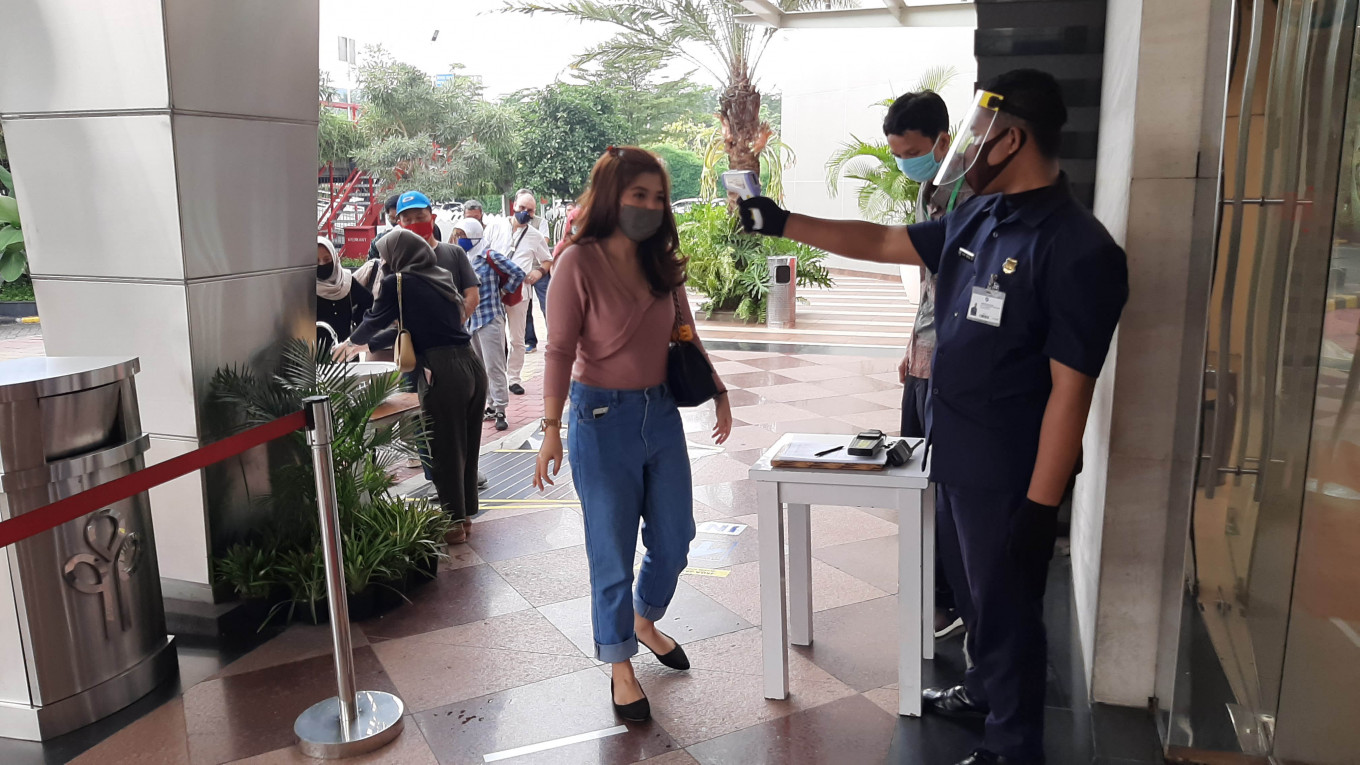Popular Reads
Top Results
Can't find what you're looking for?
View all search resultsPopular Reads
Top Results
Can't find what you're looking for?
View all search resultsAbuses feared as police move to repurpose civil security guards
Change text size
Gift Premium Articles
to Anyone
T
he National Police recently moved to regulate the civil security apparatus by issuing National Police Chief Regulation No. 4/2020 on private security (Pam Swakarsa), which critics have decried for creating the potential for abuse of power and repression.
National Police chief Gen. Idham Azis signed the regulation last month, stipulating that civilian security actors such as private security guards (Satpam) and members of the community watch (Satkamling) can be called upon to help the police maintain security and public order.
They are not to be confused with the homonymous paramilitary groups that operated in the last years of the New Order.
Private security guards, who previously wore white uniforms for day shifts and navy blue uniforms for night shifts, will also be required to wear brown uniforms with rank badges, bringing them more in line with police officers.
According to the regulation, members of the public can initiate a Satkamling program and register themselves with their local police precinct. They will be required to wear white uniforms while on duty, and are given the authority to maintain public order – including through nonjudicial measures.
Additionally, local security actors such as pecalang (traditional Balinese guards), secondary and tertiary education students with police training and members of vigilance committees can register as Satkamling with the approval of the National Police’s security maintenance agency (Baharkam).
Critics have been quick to denounce the police chief regulation, with some insisting that those who are approved by the police to be part of the Pam Swakarsa movement are prone to abusing their authority, especially if left without proper supervision.
Foundation of the Indonesian Legal Aid Institute (YLBHI) chairwoman Asfinawati said the regulation allowed people to join Pam Swakarsa without necessarily undergoing proper training to handle social conflict or maintain public order.
These nonprofessionals could thus be prone to abusing their position to commit physical violence against others and flaunt their authority, she said. Privately recruited Satpam may also be inclined to show similar behavior.
Asfinawati said the new uniforms that members of Pam Swakarsa must wear would make them resemble the police, which could lead them to believe they may use force under the pretext of maintaining public order.
“There will be groups who think they can use repressive force against others just because they have been legitimized by the police,” the legal activist told The Jakarta Post on Wednesday.
“This regulation will only incite even more social conflict.”
In the past year, the National Police have come under heavy fire over allegations of excessive force, police brutality and impunity, galvanizing calls to enact police reforms.
In July, the Commission for Missing Persons and Victims of Violence (Kontras) released a report recording 921 instances of police brutality, as well as other various forms of ill treatment such as arbitrary arrest and persecution, improper use of firearms and threats to human rights defenders.
The YLBHI also recorded 56 cases of police persecution against civilians and 67 cases of involvement in violations against freedom of expression in 2019.
With the image of a professional police force hanging in the balance, critics are worried about the effect the new police chief regulation would have on private security services and community-based patrol initiatives.
Asfinawati raised concerns over the possibility that members of Pam Swakarsa could be hired by affluent individuals to deal with conflict.
Plantation companies, for instance, might deploy an excessive number of security guards to intimidate an opponent in an agrarian conflict, she said.
In such instances, regular citizens might find it difficult to seek justice when reporting such activities to the police. According to the regulation, private security guards come under police supervision, making it likely for law enforcers to carry on with legal proceedings.
“Those with malicious intent might hire private security guards to ward off public criticism, which in turn may result in the rapid commercialization of security guards,” Asfinawati said.
Police affairs analyst Bambang Rukminto of the Institute for Security and Strategic Studies (ISESS) expressed concern that the regulation might also push for the rapid commercialization of Satkamling institutions.
The inclusion of Satkamling in the regulation implies that such community initiatives would have the same legal status as private security service providers, possibly giving them leeway to become a security business.
“Satkamling members may be able to tap into business opportunities even though they aren’t trained to be professional guards. How will the police supervise something like this?” Bambang said. “They are supposed to keep their neighborhoods safe, not [offer their services commercially].”
Both Asfinawati and Bambang called for the police chief regulation to be revoked.
But National Police spokesman Brig. Gen. Awi Setiyono said the regulation was only intended to help police maintain public order at the community level, and gave an assurance that members of Pam Swakarsa would only have limited authority and focus on using persuasive measures first.
He also stressed that the current Pam Swakarsa should not be confused with the Pam Swakarsa paramilitary security forces, which were set up by the Indonesian Military in 1998 to break up demonstrations.
“The 1998 Pam Swakarsa consisted of mass organizations, while the current Pam Swakarsa consists of Satpam and Satkamling. They are totally different,” Awi told reporters on Wednesday.










